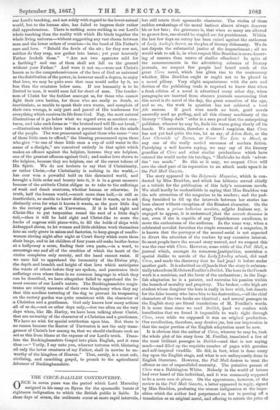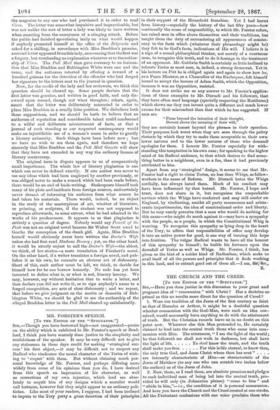THE CIRCE-DALILEH CONTROVERSY. ,
ONCE in seven years was the period which Lord Macaulay assigned in his essay on Byron for the spasmodic bursts of righteous indignation to which the British public is liable. In these days of steam, the outbursts occur at more rapid intervals,
but still retain their spasmodic character. The victim of these sudden awakenings of the moral instinct almost always deserves his or her fate ; the grievance is, that when so many are allowed to go scot free, one should be singled out for punishment. Within the last few days an outcry has been raised against the authoress of Lady Audley's Secret, on the plea of literary dishonesty. We do not dispute the substantial justice of the impeachment-; all we would wish to ask is, in what respect Miss Braddon is more deserv- ing of censure than scores of similar offenders? In spite of the announcements in the advertising columns of literary journals, we suspect few people had heard much of the great Circe novel, which has giver' rise to the controversy whether. Miss Braddon ought or ought not to be placed in a moral pillory. Very slight acquaintance with the arts and devices of the publishing trade is required to know that when a fresh edition of a novel is advertised every other day, when paragraphs are inserted from obscure journals announcing that this novel is the novel of the day, the great sensation of the age, and so on, the work in question has not achieved a bond fide success. If good wine needs no bush, good novels assuredly need no puffing, and all this clumsy machinery of the literary "Cheap Jack" order is a sure proof that the enterprising publisher, whoever he may be, finds his wares going slowly off his hands. We entertain, therefore a shrewd suspicion that Circe has not yet had quite the run, let us say, of Adam Bede, or the Last Chronicle of Barest, or Never Too Late to Mend, or any one of the really envied successes of modern fiction. Parodying a well known saying, we may say of the literary guardian of Circe and other similar productions which have entered the world under his tutelage, "Methinks he doth adver- tise ' too much." Be this as it may, we suspect Circe will owe the chief part of its reputation to an attack made upon it in the Pall Mall Gazette.
The story appeared in the Belgravia Magazine, which is con- ducted by Miss Braddon, and which has hitherto served chiefly as a vehicle for the publication of this lady's numerous novels. We shall hardly be uncharffable in saying that Miss Braddon was the sole attraction of the magazine to its readers ; and the pad- ding furnished to fill up the intervals between her stories has been almost without exception of the flimsiest character. On the stage, when a prima ballerina assoluta, as3ithe Italians say, is engaged to appear, it is understood that the seconde danseuse is not, even if she is capable of any Terpsichorean excellence, to move the enthusiasm of the audience. In the same way, when a celebrated novelist furnishes the staple romance of a magazine, it is known that the purveyor of the second serial is not expected to divert the attention of the readers by any excessive interest. So most people leave the second story unread, and we swiped this was the ease with Circe. However, some critic of the Pall Mall, a journal which, amongst its numerousluitipathies, nourishes a special dislike to novels of the LadylAzulley school, did read Circe, and made the discovery that he hadIread it before under another garb. It is admitted on all;hands that the story is substan- tiallytaken.fromM.OctaveFeuffiet'sDalileh. The hero in theFrench work is a musician, and the lover of the enchantress ; in the Eng- lish adaptation he is a painter, and restrains his passion within the bounds of morality and propriety. The broker, —the high-art student whose daughter the hero is really in love with, but deserts for the false beauty who lures him to his destruction,—all the chief characters of the two books are identical ; and several passages in the English story are literal translations of M. Feuillet's words. It is some time since we read Dalileh, sand we confess with humiliation that we found it impossible to wade right through Circe, even while we supposed it was an original production. Our recollection, therefore, may deceive lu.s, but our impression is that the major portion of the English adaptation must be new.
It is obvious that the author of Circe, whoever he may be, took the whole plot of his story from M. Feuillet, translated a few of the most brilliant passages in Dalileh—and that is not saying much—and filled up the requisite number of pages with genuine and self-inspired twaddle. He did, in fact, what is done every day upon the English stage, and what is not unfrequently done in English literature. However, the Pall Mall desires to treat the offence as one of unparalleled enormity. The putative parent of Circe was a Babbington White. Nobody in the world of letters had ever heard of this individual, and it was commonly supposed to be a mere nom de plume. On the appearance, however, of the review in the Pall Mall Gazette, a letter appeared in reply, signed by Miss Braddon, professing the utmost indignation at the impo- sition which the author had perpetrated on her in passing off a translation as an original novel, and offering to return the price.of
the magazine to any one who bad purchased it in order to read Circe. The letter was somewhat impulsive and impracticable, but was not unlike the sort of letter a lady was likely to have written when smarting from the annoyance of a stinging attack. Before the public had finished speculating lazily on what would happen if anybody presented himself at the office of the Belgravia and asked for a shilling, in accordance With Miss Braddou's promise, asecond letter appeared from this lady, announcing that the first was a forgery, but vouchsafing no explanation whatever as to the author- ship of Circe. The Pall Mall then gave currency to an insinua- tion that Miss Braddon and Babbington White were one and the same, and the authoress retorted by offering a reward of a hundred guineas for the detection of the offender who had forged her signature to the letters sent to the journal in question.
Now, for the credit of the lady and her reviewers, we think this question should be cleared up. Some people declare that the first letter was genuine, and written in good faith, and only dis- owned upon second, though not wiser thoughts ; others, again, assert that the letter was deliberately concocted in order to place Miss Braddon in a cruelly false position. We disbelieve both these suppositions, and we should be loath to. believe that an authoress of reputation and considerable talent could condescend to a wilful and deliberate misstatement of facts, or that a journal of such standing as our respected contemporary would make an injustifiable use of a woman's name in order to gratify a literary animosity. Such things have been before now ; but we have no wish to see them again, and therefore we hope sincerely that Miss Braddon and the Pall Mall Gazette will show that they have not exceeded in any way the ordinary licence of literary controversy.
The original issue in dispute appears to us of comparatively small importance. The whole law of literary plagiarism is one which can never be defined exactly. If one author was never to use any ideas which had been employed by another previously, or 'was obliged never to make a remark which had been made before, there would be an end of book-writing. Shakespeare himself took many of his plots and incidents from foreign sources, and certainly never dreamt of informing his audience from what source he had taken his materials. There would, indeed, be no object in the study of the masterpieces of art, whether of literature, or painting, or sculpture, if the student was not supposed to reproduce afterwards, to some extent, what he had admired in the works of his predecessors. It appears to us that plagiarism is entirely a question of degree. Nobody would say Peveril of the Peak was not an original novel because Sir Walter Scott owed to Goethe the conception of the dumb girl. Again, Miss Braddon herself would obviously never have written the Doctor's Wife unless she had first read Madame Bovary ; yet, on the other hand, it would be utterly unjust to call the Doctor's Wife—the ablest, we think, of her stories—a mere translation of Flaubert's novel. On the other hand, if a writer translates a foreign novel, and pub- lishes it as his own, he commits an obvious act of dishonesty. Short of this, each author must be left, we think, to decide for himself how far he can borrow honestly. No code has yet been invented to define what is, or what is not, literary larceny. We may, however, say without hesitation that to write a letter, and then declare you did not write it, or to sign anybody's name to a forged composition, are acts of clear dishonesty ; and we repeat, that before we give judgment on the merits or demerits of Bab- bington White, we should be glad to see the authorship of the alleged Braddon letter in the Pall Mall cleared up satisfactorily.































 Previous page
Previous page